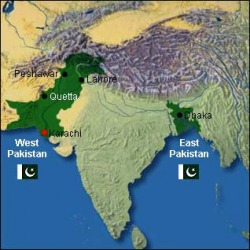In 14 August 1947, a new state called Pakistan, comprising two far-flung wings in the west and east, separated by 1600 kilometers of foreign territory, emerged on the world map. The ideological basis of that strange phenomenon was the absurd and pernicious two nation theory of Mr. Jinnah that ignored such basic elements as language and culture and considered religion as a bond strong and sufficient enough to transform a people into a nation.
The language of the people of eastern wing of Pakistan, and they were the majority, was Bangla. It had a rich tradition of literature of over a thousand years. The Bangalees also had a highly developed culture that had little in common with the culture of the people of western wing of Pakistan. The Bangalees' love for and attachment to their language and culture were great and when in 1952 the neo-colonial, power-hungry, arrogant rulers of Pakistan declared that 'Urdu and Urdu alone would be the state language of Pakistan, they sowed the seed of its future disintegration.
The people of the then East Pakistan, particularly the students, rose in angry protest against the vicious undemocratic designs of the government. Those designs really amounted to the destruction of Bangla language and culture and imposition of the language and culture of the people of western wing on the people of eastern wing. The reaction was strong and spontaneous.
The government decided to quell protests by brute force. The police opened fire on 21st February 1952 on unarmed peaceful protesters, most of whom were students, resulting in the death, among others, of Rafiq, Barkat, Jabbar and Salam. As the news of those deaths spread, the entire people of the eastern wing felt greatly involved emotionally. Those who lost their lives to uphold the prestige defend the rights of their mother-language became hallowed martyrs.
Their sacrifice at once tragic glorious and the indignation of the people against an autocratic government had far reaching effect. 21st February became a symbol and attained mythic properties, it nourished the concepts of democracy and secularism. It also contributed significantly to the flowering of Bangalee nationalism. It led to the dawning of the realization in the minds of the Bangalees that they constituted a separate nation and their destiny lay not with Pakistan but elsewhere as an independent country. The subsequent democratic mass movements of the late fifties, throughout the sixties and the seventies, and finally the struggle for independence and the war of liberation owed a great deal to 21st February.
texts are copied from a different webiste.
The language of the people of eastern wing of Pakistan, and they were the majority, was Bangla. It had a rich tradition of literature of over a thousand years. The Bangalees also had a highly developed culture that had little in common with the culture of the people of western wing of Pakistan. The Bangalees' love for and attachment to their language and culture were great and when in 1952 the neo-colonial, power-hungry, arrogant rulers of Pakistan declared that 'Urdu and Urdu alone would be the state language of Pakistan, they sowed the seed of its future disintegration.
The people of the then East Pakistan, particularly the students, rose in angry protest against the vicious undemocratic designs of the government. Those designs really amounted to the destruction of Bangla language and culture and imposition of the language and culture of the people of western wing on the people of eastern wing. The reaction was strong and spontaneous.
The government decided to quell protests by brute force. The police opened fire on 21st February 1952 on unarmed peaceful protesters, most of whom were students, resulting in the death, among others, of Rafiq, Barkat, Jabbar and Salam. As the news of those deaths spread, the entire people of the eastern wing felt greatly involved emotionally. Those who lost their lives to uphold the prestige defend the rights of their mother-language became hallowed martyrs.
Their sacrifice at once tragic glorious and the indignation of the people against an autocratic government had far reaching effect. 21st February became a symbol and attained mythic properties, it nourished the concepts of democracy and secularism. It also contributed significantly to the flowering of Bangalee nationalism. It led to the dawning of the realization in the minds of the Bangalees that they constituted a separate nation and their destiny lay not with Pakistan but elsewhere as an independent country. The subsequent democratic mass movements of the late fifties, throughout the sixties and the seventies, and finally the struggle for independence and the war of liberation owed a great deal to 21st February.
texts are copied from a different webiste.

